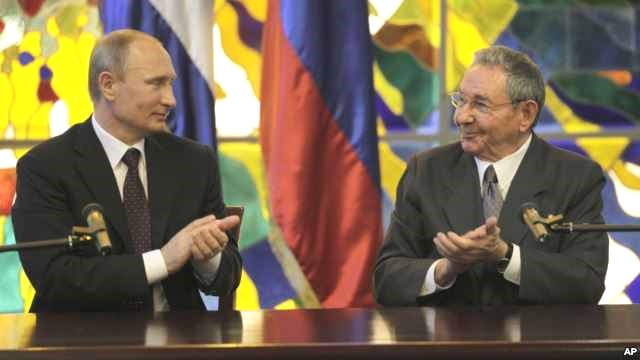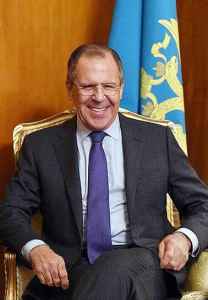
Lavrov: Cuba is not ‘drifting’ toward the U.S.
A dialogue between Cuba and the United States, leading to a normalization of relations between the two countries, does not indicate a “drift” in Havana’s relationship with Moscow, said Russian Foreign Minister Sergei Lavrov this week.
His statement, which pretty much underscores the one made also this week by Russia’s Deputy Prime Minister, Dmitri Rogozin, was published Thursday (Dec. 25) in Kommersant, Russia’s leading business daily.
[For Rogozin’s comments in Progreso Weekly, click here.]
It came at the end of a year-end interview in which the minister reviewed world events affecting Russia.

“President Vladimir Putin’s visit to Havana [in mid-July 2014] and the recent meeting of the Intergovernmental Commission on Trade and Economic Cooperation confirmed to us that it is clear that our strategic partnership with Cuba stands firm,” Lavrov said.
“The Cubans, like the Russians, will never forget those who stood by them in difficult times, and will not jeopardize a fundamental interest such as deepening their strategic partnership” with Russia, he added.
“If other countries want to be friends with Cuba, Cuba and Russia are always open to this,” the minister said. “We will never be friends with someone at the expense of someone else, and we don’t have the slightest doubt that Cubans take exactly the same position. This is the position of decent, proud people who are reliable.”
Speaking of Obama’s announcement on Dec. 17 of a rapprochement with Cuba, Lavrov said that Russia was “not only waiting for it but also had insisted on it for several decades, because it was clear that the trade and economic blockade was pointless and counterproductive and did no credit to a country like the United States.
“It was clear long ago that isolation did not prevent Cuba from developing relations with the European Union and Canada, not to mention Latin America, Russia and China. Every year, at the U.N. General Assembly, we not only called for an end to that senseless blockade but also voted for a resolution to do so. Thank God that someone in Washington finally listened.”
Lavrov considered it “very important that U.S. President Barack Obama, when announcing his administration’s move, found the courage to say that it had become clear that the blockade had brought no results.”
“In 50 years,” the Kommersant reporter, Yelena Chernenko, interjected.
Then, in an allusion to Washington’s economic sanctions against Moscow, Lavrov responded, “I hope that it will take him much less time to understand the futility of similar blockades against other countries.”
“How quickly do you estimate relations between the two countries will normalize?” Chernenko asked.
“Let’s not deceive ourselves, these are only the first steps,” Lavrov answered. “They are quite important in humanitarian terms, but are largely symbolic because the bulk of trade restrictions remained.
“There are several other things that do not depend so much on the U.S. president as on the Congress, which, as of Jan. 1, 2015, will be completely dominated by the Republican Party. How far the Republicans will find the strength and common sense to assess the situation — not in terms of a small group of anti-Castro-minded voters, but from the standpoint of U.S. interests and development of the entire region of the Americas — I do not know.”
[Photo on top is of President Vladimir Putin’s visit to Havana in mid July. Here shown with Cuban President Raul Castro.]

